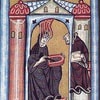

Oswald Arnold Gottfried Spengler (German: [ˈɔsvalt ˈʃpɛŋlɐ]; 29 May 1880 – 8 May 1936) was a German historian and philosopher of history whose interests included mathematics, science, and art. He is best known for his book The Decline of the West (Der Untergang des Abendlandes), published in 1918 and 1922, covering all of world history. Spengler's model of history postulates that any culture is a superorganism with a limited and predictable lifespan.
Spengler predicted that about the year 2000, Western civilization would enter the period of pre‑death emergency whose countering would necessitate Caesarism (extraconstitutional omnipotence of the executive branch of the central government).
Spengler is rendered as a nationalist, anti-democratic, and a prominent member of the Conservative Revolution, but he rejected National Socialism due to its excessive racialism. Instead, he saw Benito Mussolini, and entrepreneur types like Cecil Rhodes, as embryonic examples of the impending Caesars of Western culture, not withstanding his stark criticism of Mussolini's imperial adventures.He correctly predicted important developments of his time and strongly influenced other historians, including Franz Borkenau and especially Arnold J. Toynbee.

Help Topic: What do these scores mean?
People
Music
Fictional Characters

































